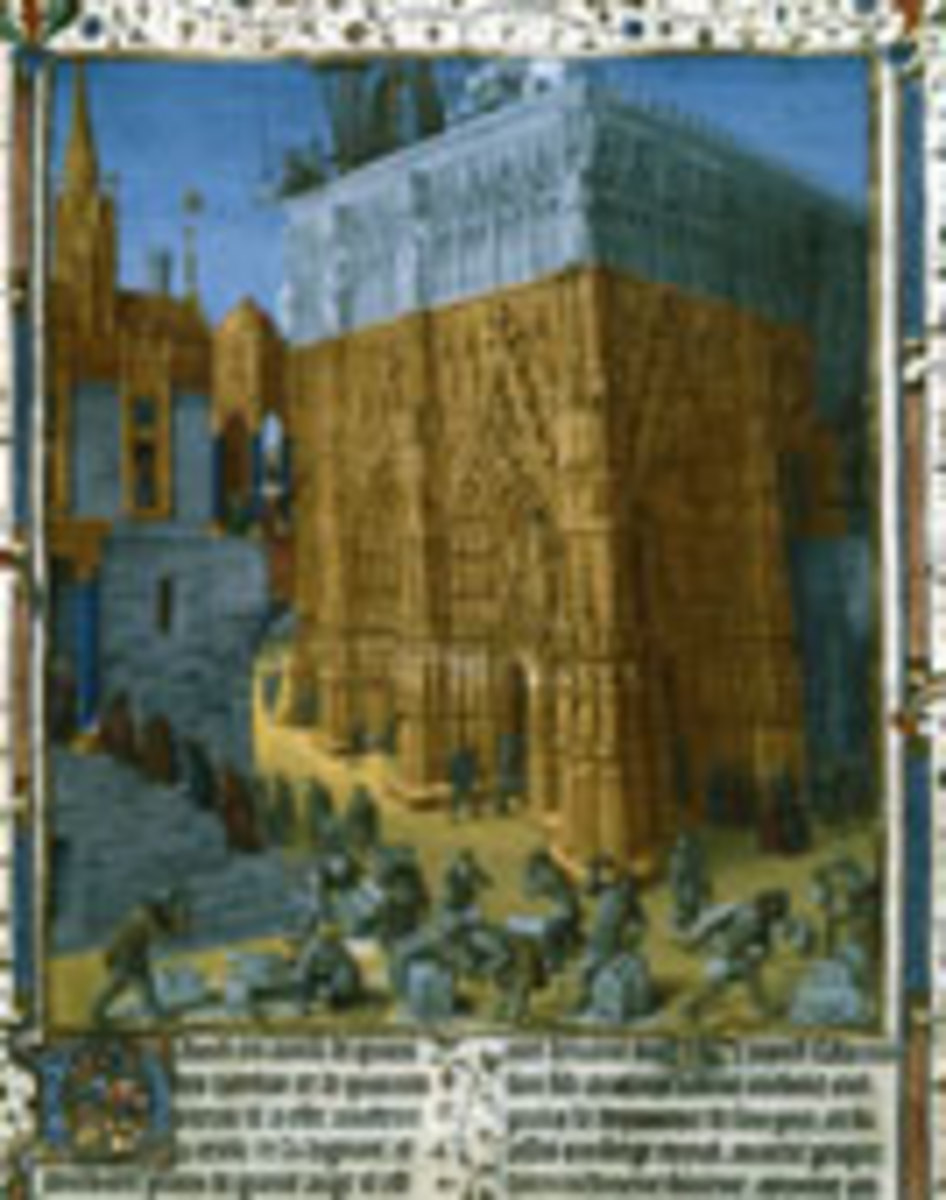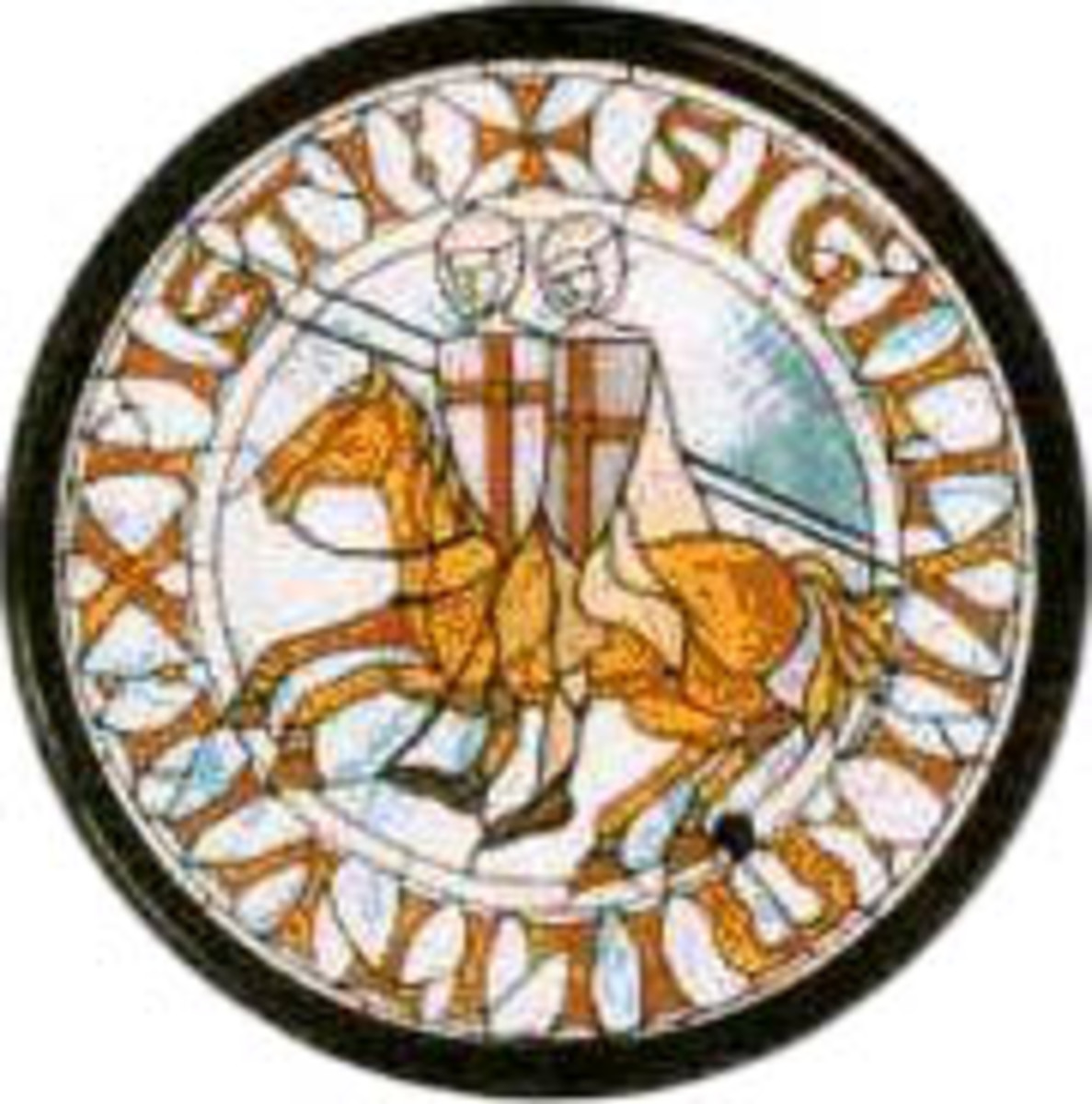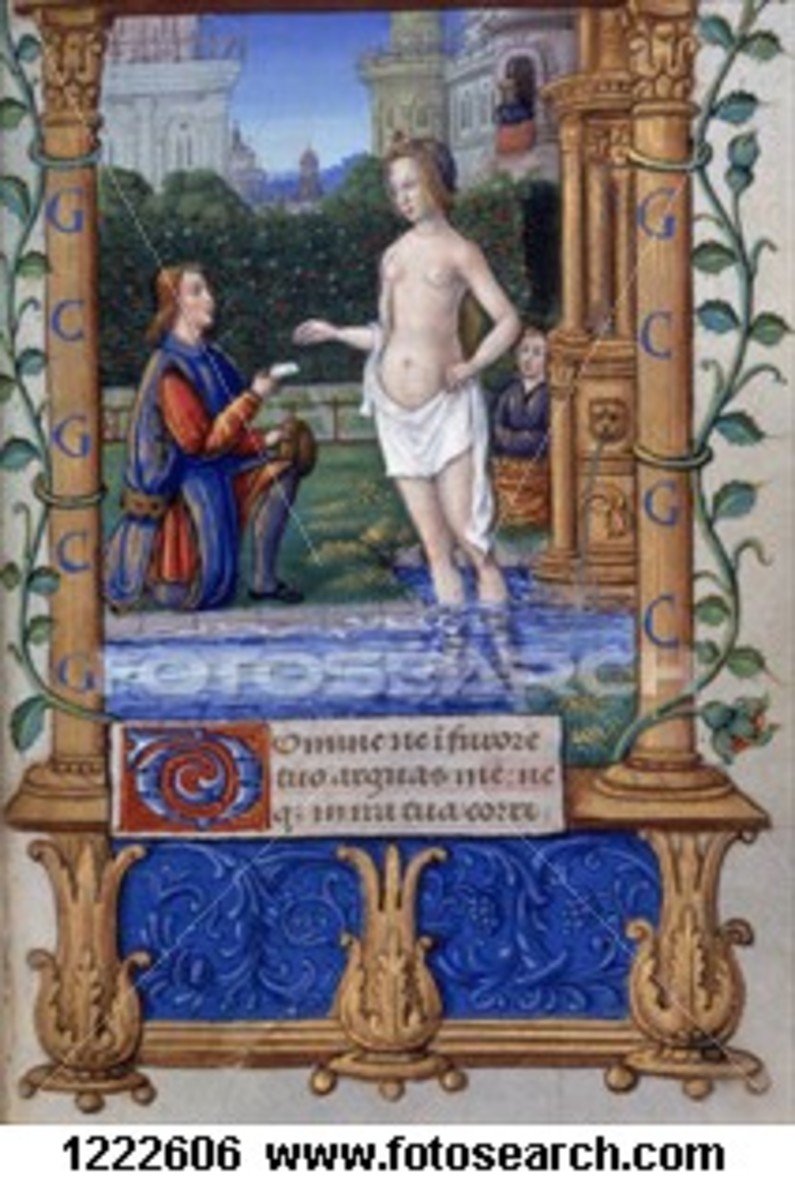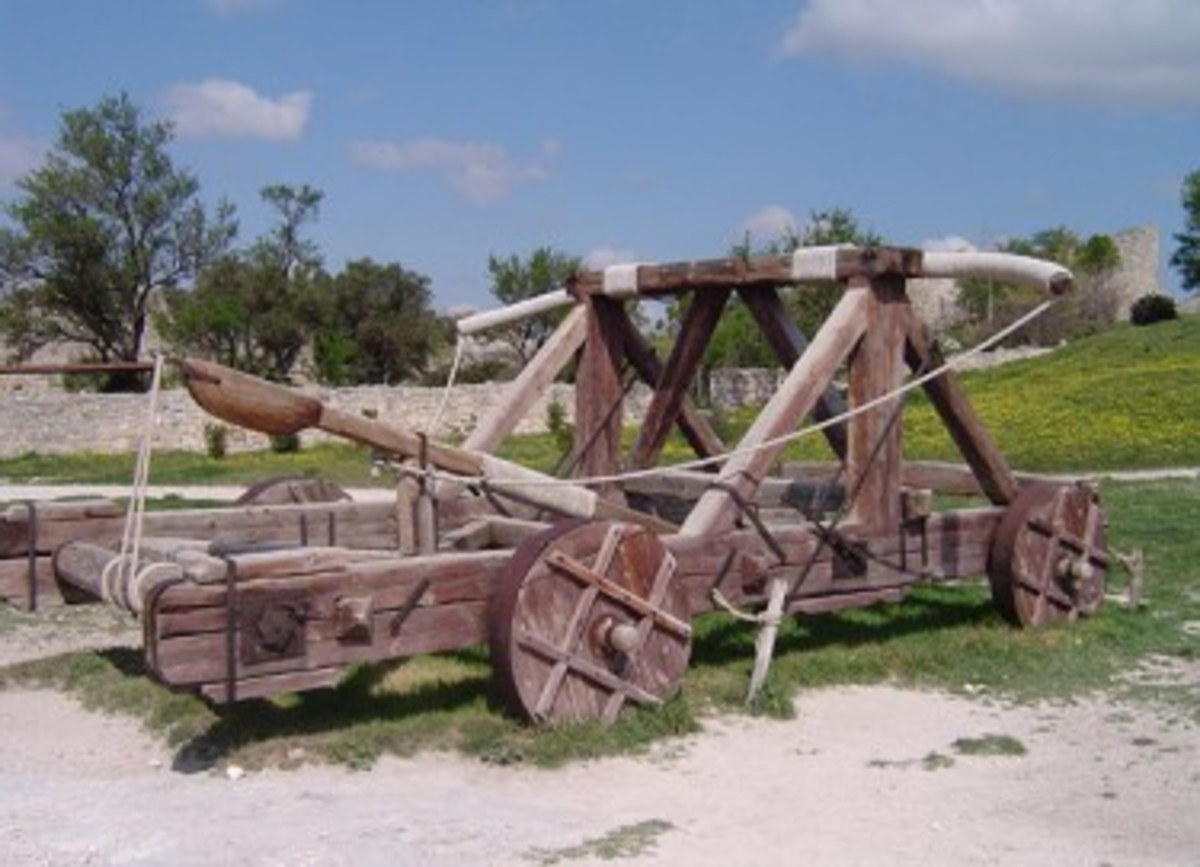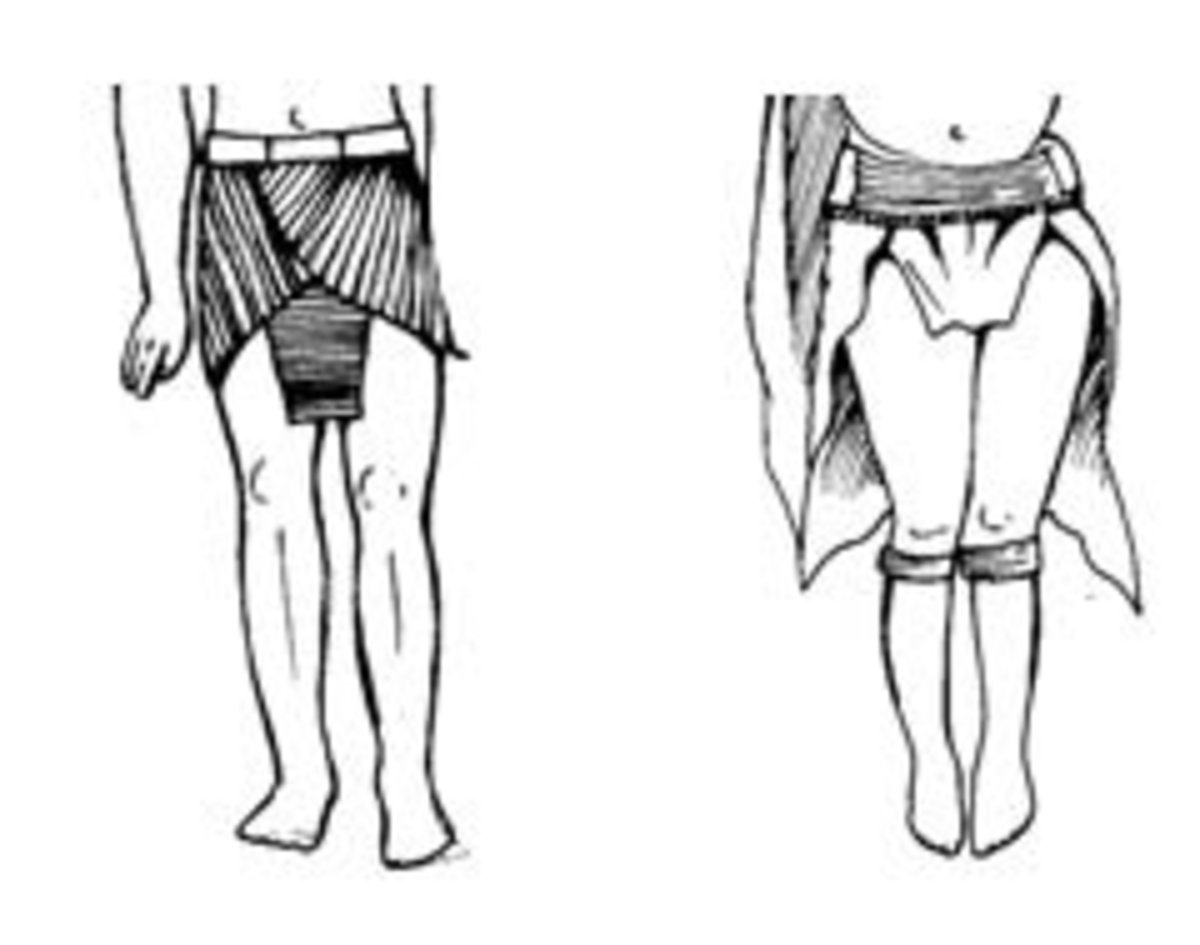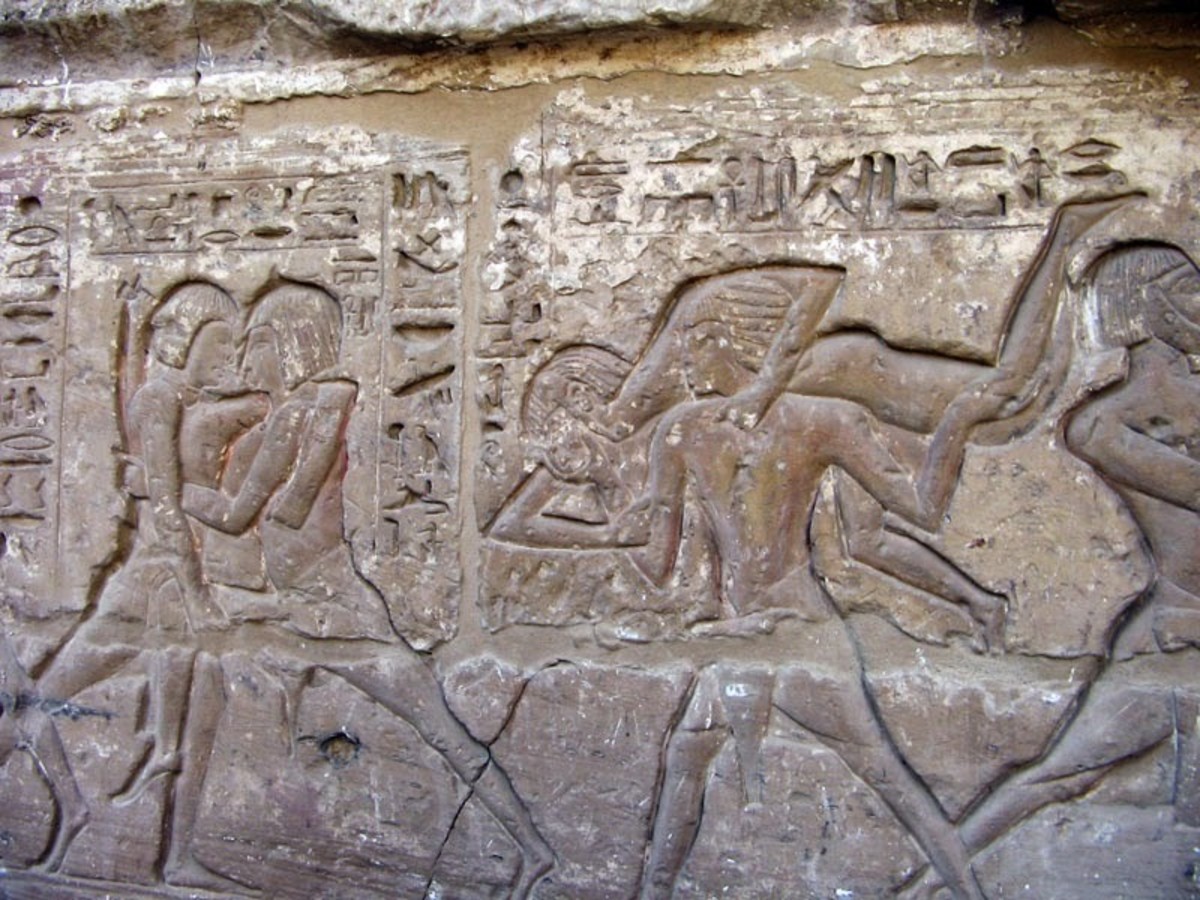Solomon: Builder of God's Temple
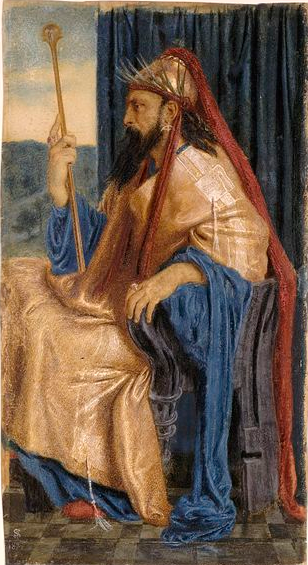
The history books do not tell a whole lot about Solomon except that he was David's son, was the king of Israel, built the first temple for God and developed trade and business for Jerusalem. If that was all you heard about the man, you might think he was boring, but there is so much more to tell. Despite his father, King David's, deathbed instructions to always obey the laws of Moses and live in accordance to God's commands, Solomon strayed so far off course that it is a wonder Judaism survived at all.
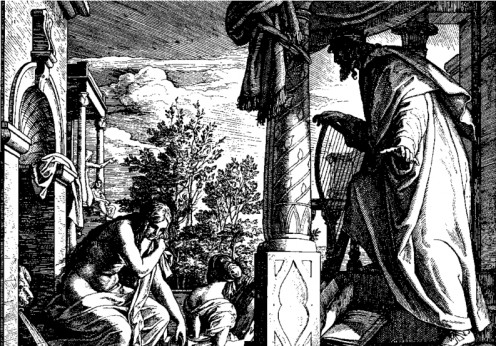
Solomon's Parents David and Bathsheba
Solomon's parents became sinners immediately upon meeting for the first time, as his mother, Bathsheba, was a married woman when his father, King David, saw her taking a bath and called her over to his place. When she became pregnant after their one-night-stand, David called her husband home from the war and tried everything he could to get the man, Uriah, to have sex with his wife, so he would think the baby was his, but nothing worked. Uriah was a faithful Israelite who insisted on following the rule of no sex during times of war. David then did something unforgivable. He sent Bathsheba's husband back to the battlefield and had him put on the front line to be killed in the war. Their first son died soon after its birth, as punishment for the sins of its parents, but when Solomon was born, and he quickly became not only Daddy's favorite but God's too.
Unlike his father's childhood, we know nothing of young Solomon until he becomes the King of Israel. He was hardly David's first-born son, many of David's wives gave him a son before he ever saw Bathsheba, but his father truly loved his mother, which is a good thing since he killed to get her, and that made Solomon special. It also helped Solomon's case that shortly after his birth, God sent David a message, through the prophet Nathan, that God too loved the boy and gave him the name Jedediah meaning beloved of God.
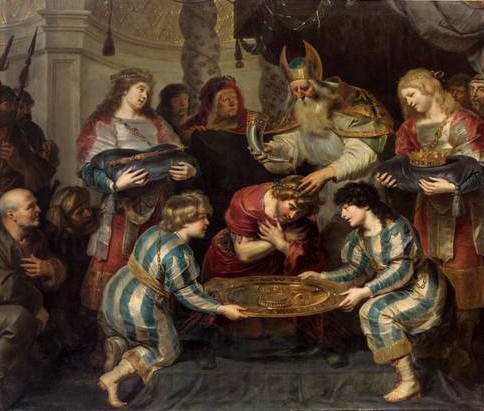
Solomon Becomes King
Because David had destroyed another man, Uriah's, family, his punishment was to lose control of his own and two of his sons tried to assume the throne while their father was still alive, neither of them was Solomon whom David had named his successor. Absalom was killed trying to assume the throne not long after Solomon was born, but this was not the first family trouble Absalom had caused. He had previously killed his half-brother for raping his sister then rejecting her. He also raped ten of his father's concubines during his siege of the palace causing disgrace to David's house.
When David was old and close to death, his son Adonijah tried to take the throne as well. This was thwarted when Bathsheba and the prophet Nathan informed David who quickly had Solomon anointed king while he was still alive, and though Solomon set aside his brother's grab for power with the provision that he prove himself worthy, family trouble appeared again after David's death when Adonijah requested the hand of his father's last concubine, Abishag. Even though David was too old to have relations with the girl, she was still David's, and trying to take a member of a king's harem was considered trying to take his throne. Solomon had his brother killed for the insult.
When Solomon became king, his father spelled out the elaborate process step-by-step. The instructions were that the priest Zadok and the prophet Nathan were to take Solomon to the Gihon Spring along with David's other officers. Solomon was to ride David's mule to the ceremony, and once there they were to anoint him king. Following the ceremony, they were to blow the horns and announce to everyone that Solomon was king then take him to the palace and place him on the throne.
Immediately after taking the throne, Solomon took care of some business for his father. He had Joab, his father's general, killed because he had committed murder, twice, out of revenge. He had Abiathar, a priest, removed from the kingdom for joining his brother Adonijah in trying to take the throne. He also had a man named Shimei killed for cursing and throwing stone at his father during Absalom's attempt to take the throne.
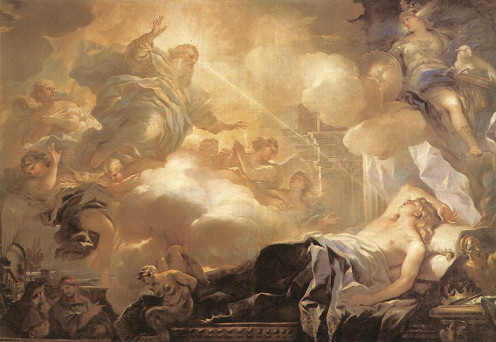
Solomon Becomes Wise
Solomon was still young when he became king and though his father was still alive to give him some guidance, Solomon was concerned about his ability to rule such a large kingdom. He did the only thing a concerned Israelite should do. He made sacrifices and offerings to God. Since there was not yet a temple in Jerusalem, Solomon went to nearby cities and did his worshiping at their altars. After doing this at Gibeon, God appeared to Solomon in a dream, which is how many prophets received their messages from God.
In the dream, God told Solomon that he would give him whatever he wanted. Solomon, at the time, was very humble like his father David had always been. He told God that he was just a child who did not know how to rule especially such a large number of God's people. He asked God for the ability to understand things, so he could figure right from wrong and make the right decisions in his judgments. God was happy that Solomon had not been greedy and asked for wealth, victory or freedom from death, so he gave him what he asked for, wisdom, but also the things he did not ask for, wealth and honor. God also promised that if Solomon followed his commands, as David had (I guess adultery and murder don't count) Solomon would also live a long live.
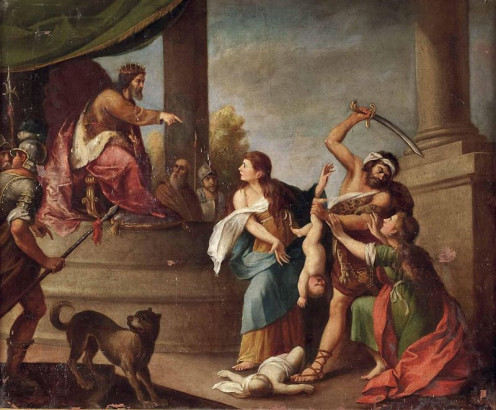
The Judgment of Solomon
It was not long after Solomon's dream vision of God that his power of wisdom would be put to the test when one day two women came to the king to settle a dispute. Both women lived in the same house and both had delivered sons within days of each other, but one of the babies had died when its mother accidentally rolled over on it in the bed. Now both women were claiming the live child as theirs and the dead baby as the other's.
To settle the dispute, Solomon called for his sword. He then proclaimed that the living baby would be sliced in two, and each woman would be given half. One woman then cried out to spare the baby and give it to her rival, as she would rather lose the baby than see it killed. The other woman told the king to go ahead then neither of them would have the baby. Solomon ordered that the child be spared and given to the woman who instructed the child be given to her rival, as she was the true mother. He reasoned that a real mother would rather lose her child than see it killed.
Solomon's kingdom started to flourish. According to 1Kings 4:21, his kingdom reached from the Euphrates River to the land of the Philistines and south to Egypt, and all the people paid tribute to Solomon making him very wealthy. He also established trade with neighboring kingdoms, including Egypt. Even Pharaoh was so impressed with Solomon that he gave his daughter's hand in marriage, which was unheard of for Egypt. Of course, this wife would cause Solomon much trouble in the future.
Word was also spreading around the world that he was the wisest man in the world and knew everything there was to know about all plants and animals, birds and fish. Everyone now wanted to hear what Solomon had to say about everything.
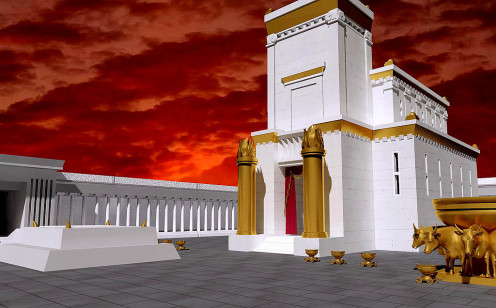
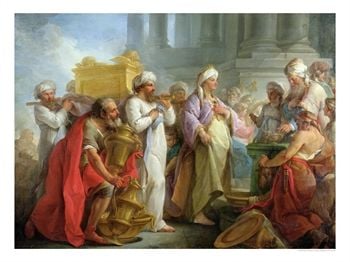
Solomon Builds the Lords Temple
During David's lifetime, he had desired to build a temple for God in which to house the Ark of the Covenant, but God had commanded that it would not be David but his son that would build him a great temple. Solomon now knew it was time to make this promise happen.
The king had grand designs for the House of God and knew it would take not only money but supplies to get the job done. Along with the tribute he had been collecting from all the nations of Israel, the king of Tyre, Hiram, offered to proved the cedar for the project, which Solomon paid for with annual supplies of grain and olive oil. As with Egypt, Tyre was now solidly behind Solomon's kingdom.
For a detailed description of the temple Solomon built for God, see 1 Kings 6
.
.
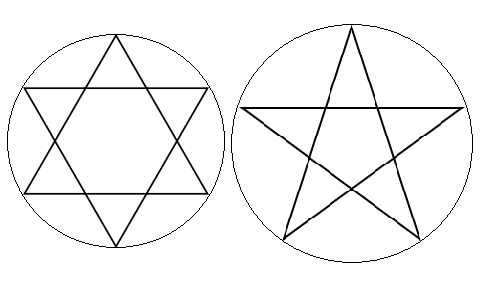
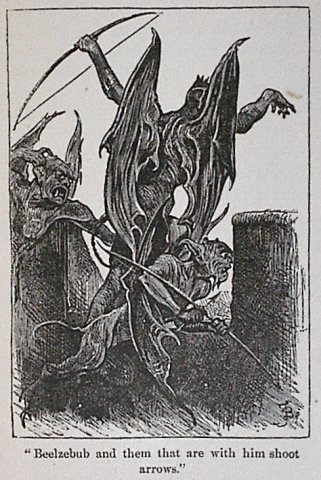
Solomon would also need to rely on supernatural help to get the temple built. This is where the story of Solomon's ring begins, as per the Testament of Solomon. There was a young boy who was very dear to the king, but one day a demon by the name of Ornias attacked the boy stealing his money and his strength. Solomon prayed to God on behalf of the young man then the archangel Michael gave him a ring. On the ring was the seal of God. Some say the seal was in the shape of a pentagram, which came to be associated with Satan worship, other's made it a hexagram, also known as the Star of David.
With this ring, Solomon was able to control demons. He used it to gain control of Beelzebub, leader of all demons. With Beelzebub under his control, all of the remaining demons were forced to do Solomon's bidding and he put many, including Asmodeus, to work on building God's temple.
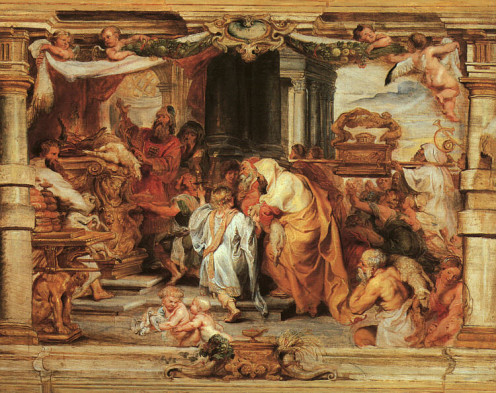
It took Solomon seven years to build the temple. When it was finished, there was a great celebration and sacrifice to God. God was so pleased with all that Solomon had done, that he once again appears to Solomon in a dream. God told Solomon that he was pleased with what the son of David had accomplished, and promised that if Solomon continued to follow Gods rules, that all of Israel would prosper. Unfortunately, Solomon was not able to keep that promise to God he had made when he first became king.
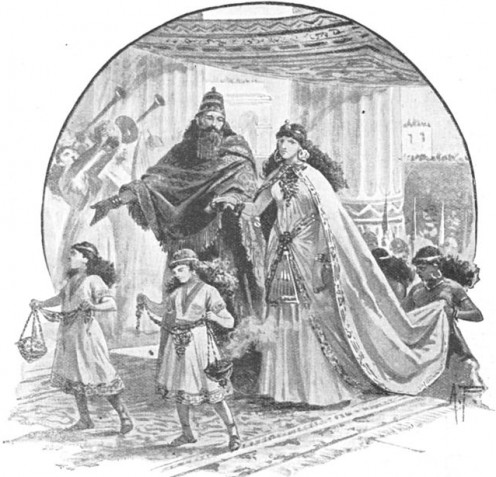
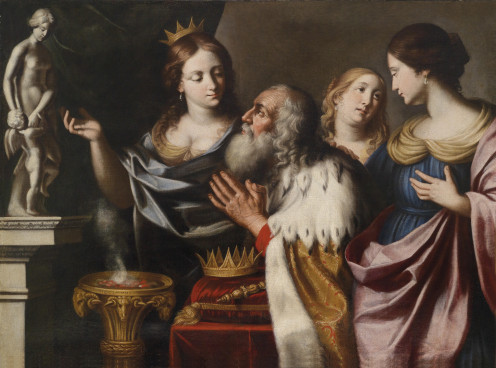
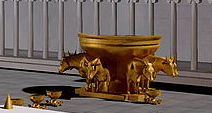
Solomon's Wives
Solomon's greatest downfall would prove to be women. Though he loved his first wife, the daughter of Pharaoh, he would go on to amass 700 wives and 300 concubines in total. With all the wealth and power God had allowed him to build, it seems that all of the tribes of Israel and all the neighboring kingdoms wanted one of their daughters to be a wife of Solomon, and he was happy to take them all. While his father, David, had several wives and concubines, just nowhere near as many as his son, these women were all from the tribes of Israel. Their religious beliefs were the same as their husband's, but Solomon was marrying foreign women who had worshiped other gods before their marriage and those beliefs were hard for them to give up.
Solomon's first transgression was with a Sonmanite girl named Shunammite. It was love at first sight for Solomon, and he asked for the girl's hand in marriage, but the priest of that land insisted that he worship their gods Raphan and Moloch before he be allowed to marry her. Solomon at first refused. He had never worshiped any god but the God of Israel, and it was a sin to do so, but in his own testament, he declared that Eros, the Greek god of Love, stirred up so much want in him that he finally sacrificed to her gods.
After the first time, it would not be so hard for Solomon to give in to the many wives he loved so greatly and join them in sacrifice to their own native gods. Though much of the fault was placed on the Pharaoh's daughter, it was not only her gods Solomon would acknowledge. Solomon would even place an idol right outside of the Most Holy Place, the part of the temple that housed the Ark. It was called the Sea, which was a large basin resting on six bronze oxen. This was a very public display, and risky considering what happened just after the Israelites left Egypt, but it was not the only idols the king would show in public. Solomon's own mighty throne was a masterpiece of gold.
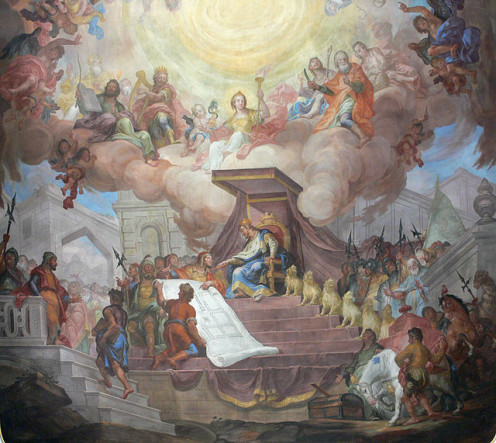
Solomon's Throne
Solomon's throne, as described in the Targum Sheni, an elaboration of a story not found in the Tanakh, had twelve lions and twelve eagles all made of gold. The throne was round and sat atop six golden steps. Each step also included two golden animals. Step one had an ox on one side and a lion on the other. Step two had a bear and a lamb. On step three, was a panther and owl. On four, was an eagle and a peacock. On the fifth step, was a cat opposite a hen, and the sixth a hawk and a dove. One the thrown itself was a golden dove with a gold hawk in its clutches. In addition to all the golden animals, many of the parts moved, as did the throne itself always positioning itself behind the king.
The throne was intended to always serve the King of Israel, but thanks to Solomon, that never got a chance to happen. The throne ended up in Persia, despite trying its best to fend off takers. Though it changed hands many times, usually through conquest, the lions made sure no one was ever able to sit on it until it came into the hands of Darius I of Persian. For more details see Targum Sheni.
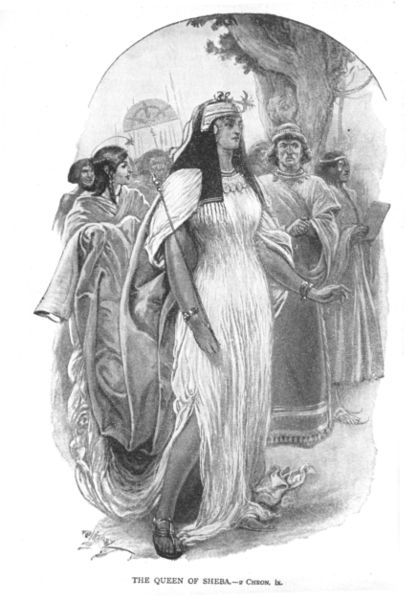
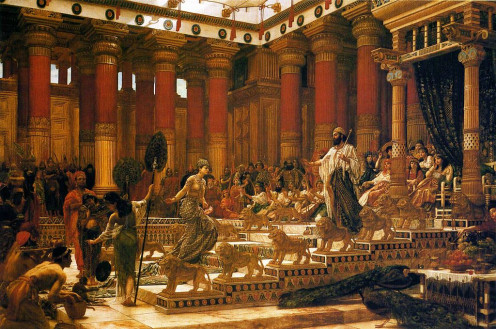
The Queen of Sheba
Even though Solomon has more wives and concubines than he could handle, there was one more very special woman in his life. Once word of Solomon's wisdom and riches spread across the word, The Queen of Sheba became so interested in the wise king that she had to see him for herself. The exact location of Kingdom of Sheba is disputed. Some say it was in Ethiopia while others say Yemen. Regardless, the queen traveled a great distance to visit Solomon.
She had gone to see the great wisdom of the king, but received far more from her visit. While the book of 1 Kings does not go into detail about what happened between the King of Israel and the Queen of Sheba, the Kebra Nagast, a holy book for Ethiopian Christians, goes into great detail.
The queen was a virgin when she arrived in Jerusalem, because she was cursed with the foot of a goat on one leg. This curse was the result of her mother lusting after a goat while she was pregnant with the future queen. Though she was cured, by the God of Israel, upon her first visit to the temple Solomon had built for God, she wanted to remain a virgin.
Now we have already seen that Solomon loved women, and in a short time, he was lusting after the queen. He made it known that he wanted to sleep with her, but she begged that he not spoil her or her reputation. Solomon made and agreement with the queen. He would not force himself on her, but if at any time, while she was in Jerusalem, she would come to his bed, she would become his wife and give herself to him freely. The Queen of Sheba agreed knowing she would never go to his bed.
Now, Solomon's great wisdom comes into play again. While the queen was staying in the palace, he commanded that only spicy hot meals be served. As the queen was not used to this kind of food, she found herself drinking large amounts of water to cool the burn. After several days of hot food, Solomon ordered that any member of his staff found giving the queen water would be put to death. When the queen retired that evening, she got a terrible case of heartburn and desperately needed a cool drink of water. She wondered through the palace in search of water but found none. Eventually, a member of the household staff told the queen that the only place she would find water was at the king's bedside. She was determined not to go there, but the heat got so bad that she thought she would die. She gave in and went to Solomon's bedside. Solomon pretended to be asleep while the queen drank away her heartburn, but when she turned to leave, he sprang from the bed and proclaimed her his wedded wife. She had been tricked, but she lived up to her word. She gave herself freely to her new husband.
Before the queen returned home to her people, she informed Solomon that she was with child. She wanted to know what she should do with the baby when it was born. Solomon told her that if it was a girl, she should keep her, but if it was a boy, she should send him to his father when he became a man. Solomon promised to make him king of her people. The queen then asked how Solomon would recognize the boy when the time came. Solomon then gave her his ring. He told her that when the young man wearing that ring on his own hand arrived, he would know it was their son. The Queen of Sheba then set sail for her homeland.
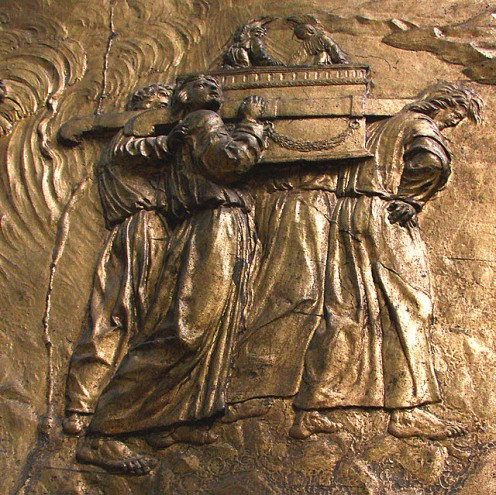
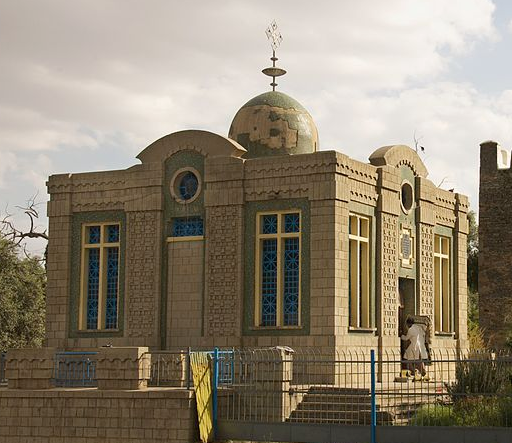
As it so happened, the queen gave birth to a son and named him David after his grandfather. As queen of her land, she raised him in wealth and splendor, but when he became a man, he asked of his father. The Queen of Sheba then told her son that he was the son of King Solomon, and he was to go see his father now that he was a man, so he would become king of her kingdom. She placed his father's ring on his finger and sent him off to Jerusalem.
As Solomon had promised, he was thrilled when his son arrived, and he saw the ring. He announced that his son was now the king of his mother's lands and took him to the temple to pray before the Ark. Young David was amazed by the Ark of the Covenant and asked his father to let him have it. Now Solomon could not give away the Ark or let it leave Jerusalem, but he told his son that if it was God's will, the boy would leave with it, but that he, Solomon, could know nothing about it because he would have to swear before his God that he had not approved.
David then set about creating a fake Ark and forced some priests to carry the real one to his ship and return with him to his homeland. Everything he did was behind Solomon's back, and when the people learned that the true Ark was gone, he was able to swear that he was not involved nor did he give permission.
To this day, many believe that the Ark of the Covenant rests in Ethiopia where it was taken by Solomon's son. Others contend that Solomon was the one that created a fake Ark, and it was that one his son took home with him.
Menelik I was believed to be Solomon's son David. He became the first Emperor of Ethiopia and was called the son of Solomon from the House of David. His rule started sometime around 950 BC. Some historians dispute this, though others believe this empire was a pre-curser to the Kingdom of Axum. The same group that would eventually overthrow the Kingdom of Kush.
Solomon's Death and Legacy
In Solomon's old age, God made it clear that Solomon had broken the covenant with him, and therefore the agreement God had made with David was over. A son of Solomon would not rule over all of Israel, only Judah. When this became clear, Solomon started to have issues. God had selected a young man named Jeroboam to become king of the northern Israelites. Once Solomon learned of this, he tried to have the boy killed, but he escaped to Egypt. He stayed there biding his time until Solomon died. Still God gave Solomon's son, Rehoboam, a chance to retain the full throne of Israel. The people of Judah quickly appointed Rehoboam their king, but when he went to the Israelites, the people told him that his father had been cruel to them, but if he agreed to lighten up a bit, they would accept him. Rehoboam sought advice from his father's men, and they suggested that he lighten up, but when he sought advice from his own friends, they suggested he tell them that if they thought his father was bad, they had not seen anything yet. Of course, the people rejected him and named Jeroboam their new king.
So Solomon lost the covenant of David's line of sons ruling all of Israel in just one generation, but his family did rule Judah for many generations to come in addition to his son Menelik's line ruling in Ethiopia for generations. He is revered by the major religions of the world, as well as being one of history's great rulers despite his shortcomings. He also gained a following, accurate or not, as a magical ruler over demons, genies and angels. In the end, he became a great source for writers of both fact and fiction making it difficult to know the true Solomon, King of the Israelites.







